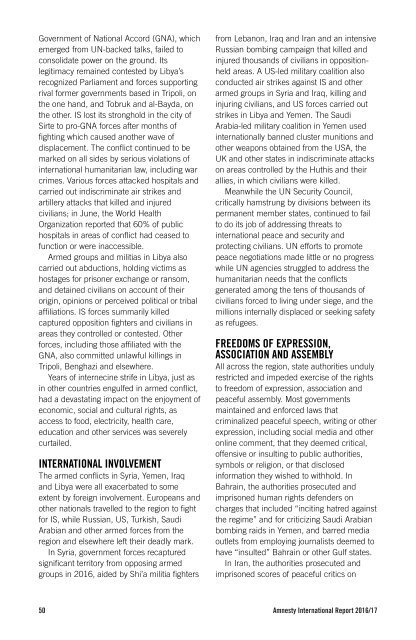AMNESTY INTERNATIONAL REPORT 2016/17
2lEHU9j
2lEHU9j
Create successful ePaper yourself
Turn your PDF publications into a flip-book with our unique Google optimized e-Paper software.
Government of National Accord (GNA), which<br />
emerged from UN-backed talks, failed to<br />
consolidate power on the ground. Its<br />
legitimacy remained contested by Libya’s<br />
recognized Parliament and forces supporting<br />
rival former governments based in Tripoli, on<br />
the one hand, and Tobruk and al-Bayda, on<br />
the other. IS lost its stronghold in the city of<br />
Sirte to pro-GNA forces after months of<br />
fighting which caused another wave of<br />
displacement. The conflict continued to be<br />
marked on all sides by serious violations of<br />
international humanitarian law, including war<br />
crimes. Various forces attacked hospitals and<br />
carried out indiscriminate air strikes and<br />
artillery attacks that killed and injured<br />
civilians; in June, the World Health<br />
Organization reported that 60% of public<br />
hospitals in areas of conflict had ceased to<br />
function or were inaccessible.<br />
Armed groups and militias in Libya also<br />
carried out abductions, holding victims as<br />
hostages for prisoner exchange or ransom,<br />
and detained civilians on account of their<br />
origin, opinions or perceived political or tribal<br />
affiliations. IS forces summarily killed<br />
captured opposition fighters and civilians in<br />
areas they controlled or contested. Other<br />
forces, including those affiliated with the<br />
GNA, also committed unlawful killings in<br />
Tripoli, Benghazi and elsewhere.<br />
Years of internecine strife in Libya, just as<br />
in other countries engulfed in armed conflict,<br />
had a devastating impact on the enjoyment of<br />
economic, social and cultural rights, as<br />
access to food, electricity, health care,<br />
education and other services was severely<br />
curtailed.<br />
<strong>INTERNATIONAL</strong> INVOLVEMENT<br />
The armed conflicts in Syria, Yemen, Iraq<br />
and Libya were all exacerbated to some<br />
extent by foreign involvement. Europeans and<br />
other nationals travelled to the region to fight<br />
for IS, while Russian, US, Turkish, Saudi<br />
Arabian and other armed forces from the<br />
region and elsewhere left their deadly mark.<br />
In Syria, government forces recaptured<br />
significant territory from opposing armed<br />
groups in <strong>2016</strong>, aided by Shi’a militia fighters<br />
from Lebanon, Iraq and Iran and an intensive<br />
Russian bombing campaign that killed and<br />
injured thousands of civilians in oppositionheld<br />
areas. A US-led military coalition also<br />
conducted air strikes against IS and other<br />
armed groups in Syria and Iraq, killing and<br />
injuring civilians, and US forces carried out<br />
strikes in Libya and Yemen. The Saudi<br />
Arabia-led military coalition in Yemen used<br />
internationally banned cluster munitions and<br />
other weapons obtained from the USA, the<br />
UK and other states in indiscriminate attacks<br />
on areas controlled by the Huthis and their<br />
allies, in which civilians were killed.<br />
Meanwhile the UN Security Council,<br />
critically hamstrung by divisions between its<br />
permanent member states, continued to fail<br />
to do its job of addressing threats to<br />
international peace and security and<br />
protecting civilians. UN efforts to promote<br />
peace negotiations made little or no progress<br />
while UN agencies struggled to address the<br />
humanitarian needs that the conflicts<br />
generated among the tens of thousands of<br />
civilians forced to living under siege, and the<br />
millions internally displaced or seeking safety<br />
as refugees.<br />
FREEDOMS OF EXPRESSION,<br />
ASSOCIATION AND ASSEMBLY<br />
All across the region, state authorities unduly<br />
restricted and impeded exercise of the rights<br />
to freedom of expression, association and<br />
peaceful assembly. Most governments<br />
maintained and enforced laws that<br />
criminalized peaceful speech, writing or other<br />
expression, including social media and other<br />
online comment, that they deemed critical,<br />
offensive or insulting to public authorities,<br />
symbols or religion, or that disclosed<br />
information they wished to withhold. In<br />
Bahrain, the authorities prosecuted and<br />
imprisoned human rights defenders on<br />
charges that included “inciting hatred against<br />
the regime” and for criticizing Saudi Arabian<br />
bombing raids in Yemen, and barred media<br />
outlets from employing journalists deemed to<br />
have “insulted” Bahrain or other Gulf states.<br />
In Iran, the authorities prosecuted and<br />
imprisoned scores of peaceful critics on<br />
50 Amnesty International Report <strong>2016</strong>/<strong>17</strong>


